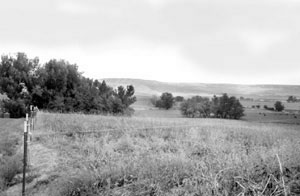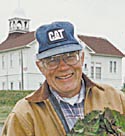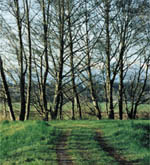Change of seasons on the farms
by Stephanie Taylor, Director, Farmland Fund
This article was originally published in December 2004

(December 2004)
Bennington Place news
by Joel Huesby

Last spring I had difficulty sourcing “clean” (no hormones, antibiotics, animal protein supplements, drylotted, etc.) stockers of a weight that would finish for sale this calendar year. I currently have 110 head which will be available for market when I can put the finishing grass fat on them next summer. So far I have marketed about 80 head of beef directly since June and have sold everything I have available. I won’t sell beef that is not finished.
I have utilized only about one-fifth of the total 399 acres for the pasture-finished program. The remainder is put up for commodity hay by a neighbor, which won’t happen next year. Four fields of the Bennington Place land have been utilized for this pasture. I currently have about 700 tons for sale/feed.
Dave Horn, an organic field inspector, will be coming tentatively to the farm on November 9. We are working on the idea that the entire farm, including the Bennington Place, can be certified organic this winter (except for a 54-acre field that was in wheat)! More later.

Dungeness Organic Produce
by Nash Huber
As the winter cold weather sets in and the first frosts of the year begin to make their silent strikes under the cover of night, we savor what remains of our leafy, delicate greens. Mizuna, baby bok choi, tat soi, arugula, mustard greens, fennel, parsley, cilantro, baby dill and celery continue to fill our plates and boost our immune systems.

Our winter crops of parsnips, celery root, beets, cabbage, kale, spinach, brussel sprouts, turnips, carrots and winter squash such as Acorn, Buttercup and Delicata, thrive as the temperature steadily drops, and appear to promise high yields through March, ensuring a financially stable farm for yet another year. (Wait, maybe that’s an oxymoron … financially stable farm?)
We welcome 20 wieners to the Delta Farm! These pigs will eat themselves silly on organic vegetables and chomp away on the 25 tons of barley we grew and are now storing over the winter in the Delta Barn. This spring, we’ll butcher and sell half and whole hogs to customers all over the Olympic Peninsula and Seattle. A free-range quality product, hormones and antibiotic-free, Nash’s Farm is proud to provide our customers with an alternative to unhealthy commercial meat.
Gifts that save farmland
Buy a Chinook Book: $10 goes to save farmland!
Save money and show your support for sustainable businesses with the Chinook Book. The book features more than $5,000 in money-saving coupons and is filled with ideas and resources for smart, healthy living. It makes a great gift. Available for $20 in all PCC Natural Markets. (www.chinookbook.net)
Donor Roster (October 1-31, 2004)
Anonymous: 1
Lawrence E. Chazen
Elinore Cunningham
Betty H. Hughes
Douglas W. Ireton and Kinberlee Conway Ireton
John and Sandra Kahler
R. Long
Allen H. Olsen and Laura A. Hunter
Mark and Nancy Tucker
Magdalena Webb
PCC Staff
More than 100 PCC staff members make payroll deductions twice a month.
Businesses and Organizations:
Choice Organic Teas
Clean Earth/PureAyre
Fish Brewing Company
Newman’s Own Organic
Pacific Natural Sales
Rouge Ales
Stonyfield Farm, Inc
TalkingRain Beverage Company
Whit Press
Wildwood Natural Foods, Inc.
The PCC Farmland Fund works to secure and preserve threatened farmland in Washington State and move it into organic production. For more information, see the PCC Farmland Fund web pages.
